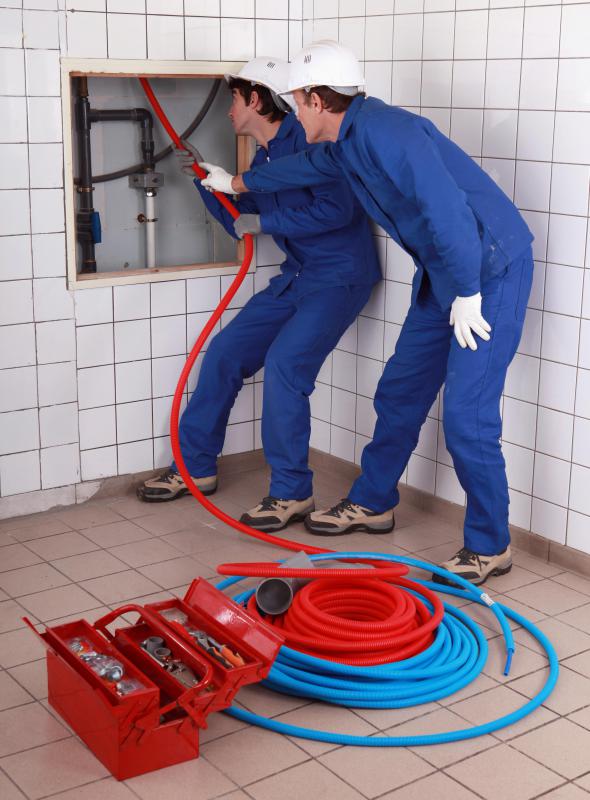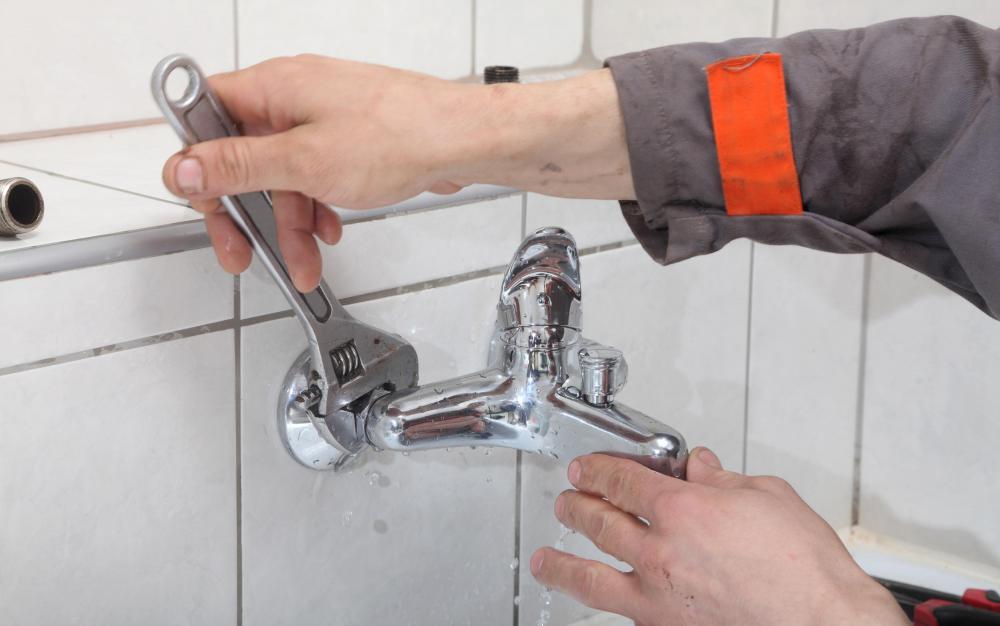At WiseGEEK, we're committed to delivering accurate, trustworthy information. Our expert-authored content is rigorously fact-checked and sourced from credible authorities. Discover how we uphold the highest standards in providing you with reliable knowledge.
How do I Become a Licensed Plumber?
A person who is interested in becoming a plumber should be good at basic math and measurements, love working with his or her hands, and be physically fit. The requirements to become a licensed plumber vary some between jurisdictions, yet most include formal classroom training, on-the-job training through an apprenticeship program, and passing certain proficiency tests. Anyone wishing to pursue this trade should first determine the local and national licensing requirements, find an apprenticeship program, and investigate the available trade school options.
Canada and the US have harmonized national plumbing standards, but the actual licensing requirements are governed by local states or provinces. This is also true in the United Kingdom and Australia. Because of a shortage of licensed plumbers, New Zealand and Australia have a joint recognition agreement regarding licenses granted in either country. The specific requirements to become a licensed plumber in any jurisdiction can be acquired from the agency governing trade licenses, and is often published on the Internet.

In most jurisdictions, a person who wishes to become a licensed plumber must first acquire an apprentice, or provisional, license. In the UK, the applicant must pass a very basic skills test before the provisional license is issued. One universal requirement at this level is that the apprentice work for a period of time, often up to four or five years, under the direction of a fully licensed plumber. In some areas, formal certification training can reduce the number of actual work hours required of an apprentice.

In most states in the US, a plumber’s license covers both gas and water applications. In the UK, Australia and Canada, gas and water require separate licenses. In the past, the only people who could become a licensed plumber in the UK were young people between the ages of 16 and 24 who left school to pursue a trade, an approach which made it almost impossible for anyone over 24 to enter this field. This route is still open, and a person can acquire the National Vocation Qualification (NVQ), or SNVQ in Scotland, through a combination of formal classroom training and work-based experience under a licensed plumber.

A second training route has opened for anyone in the UK wishing to become a licensed plumber, regardless of his age, through several college programs. An applicant must first take the British Plumbers Employees Council (BPEC) training test, which ascertains if he has the aptitude to successfully complete the program. After passing the test, he can enroll in classes at a college which offers the classroom training and practical experience required to become licensed. The training for an apprentice is similar in all jurisdictions, and includes learning methods for joining and assembling pipes, methods for testing pipe systems, and basic code and safety requirements. An apprentice is also trained in the maintenance of tanks, pumps and plumbing fixtures.
After completing the apprenticeship, a person must provide evidence that the work and course requirements have been met to the appropriate regulatory agency, and pass the proficiency exam, in order to become a licensed plumber. These exams require knowledge of applicable codes and the operation of various plumbing systems. Once a person is granted a journey or plumber contractor's license, he will be allowed to work without supervision assembling plumbing systems, laying and connecting pipes, installing fixtures and appliances, and performing pressure tests on completed systems. He should also be able to locate any possible electrical obstructions and check systems for compliance with safety standards.
In the US, a journey with several years experience can apply for a master license. This level requires additional testing, but offers greater career choice. A master plumber is often involved in designing new layouts and blueprints and can work in both commercial and industrial applications. In other countries, a plumbing contractor may want to acquire additional licenses in gas, roof plumbing, backflow prevention testing, or another designated specialty.
AS FEATURED ON:
AS FEATURED ON:













Discussion Comments
If someone wants to become a plumber in multiple countries, is there one way of becoming certified transferable to another country? My brother right now is learning about properly unclogging toilets in Calgary and he was curious about that.
Post your comments